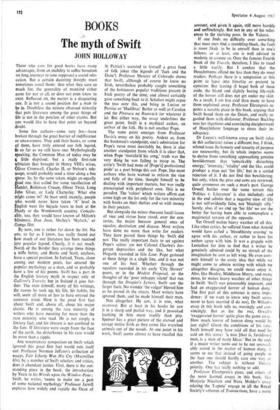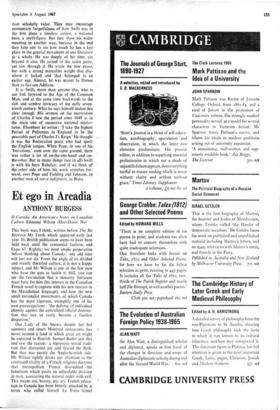The myth of Swift BOOKS
JOHN HOLLOWAY
Those who care for good books ha‘e many advantages, from an inability to suffer boredom on long journeys to (one supposes) a sound edu- cation. But a certain daunting thought must sometimes assail them: that what they care so much for, the generality of mankind either cares for not at all, or does not even know to exist. Reflected on, the matter is a disquieting one. It is not a sound position for a man to ke in. Doubtless the minute obsessed minority that puts literature among the great things of life is not in the position of other cranks. But one would like to have that point set beyond doubt.
Some few authors—some very few—have broken through the great barrier of indifference or unawareness. They and their books, or some of them, have truly entered our folk legend, hi so far as we still have one. Mythologically Viking, the Common Man of today may be little deprived; but a really first-rate witticism that brought in Henry VIII's wives, Oliver Cromwell, Charles II, or Nelson's tele- Scope, would probably send a fitter along a bus foodSo, by the same token, might an equally ood one that called for some recollection of Hamlet, Robinson Crusoe, Oliver Twist, Long John Silver, or Lady Chatterley. What else might come in? At least until recently, people who would never have taken 'A' level in English went for bicycle tours to look at the hardy or the Wordsworth country. Conceiv- ably, too, they would have known of Milton's blindness, Don Juan, Shelley's 'Skylark,' or Gunga Din.
By now, one is rather far down the list. No one, so far as I know, has really found out how much of our literature has been received into popular legend. Clearly, it is not much. North of the Border they arrange these things a trifle better, and Burns and Scott, anyhow, have a special position. In Ireland, Yeats, alone among our modem poets, has entered the popular mythology as a man, and so probably have a few of his poems. Swift has a part in the English literary myth in respect only of Gulliver's Travels; but in Ireland it goes fur- ther. The man himself, many of his writings, the causes he took up, his life, his habits, his will, seem all more or less to have entered the common mind. Here is the great first fact about Swift and, above all, about his major classic. He is among the rare minority of writers who have meaning for more than the rare minority who read. He is not simply a literary fact, and his interest is not confined to the fans. If literature were swept from the face of the earth, the disturbance in his case would be more than a ripple.
Any tercentenary symposium on Swift which ignored this great first fact would rule itself out. Professor Norman Jeffares's collection of essays, Fair Liberty Was His Cry (Macmillan 63s), by a number of Swift scholars and critics, does it abundant justice. First, there is the out- standing piece in the book, the introduction by Yeats to his Words upon the Window-Pane: Swift, he writes, 'seems to make me a part of some national mythology.' Professor Jarrell explores how widely and rapidly the Dean of St Patrick's accreted to himself a great fund of folk jokes (the legends of 'Jack and the Dane'). Professor Mercier of Colorado shows that Swift, although of course he knew no Irish, nevertheless probably caught something of the boisterous popular traditions present in Irish poetry of the time, and almost certainly gave something back to it. Scholars might argue the toss over this, and bring in Lucian or Persius or 'Hudibras' Butler as well as Carolan and the Plearaca na Ruarcach (or whatever it is). But either way, the essay underlines the great point. Swift is a mythical author, an author of the folk. He is not another Pope.
The same point emerges from Professor Davis's essay on his poetry. Ardent as, from the bookman's standpoint, one's admiration for Pope's verse must inevitably be, there is also another standpoint from which it is clear that, when Pope `moraliz'd his song,' truth was the very thing he was failing to stoop to. The critic's 'Swift had none of [Pope's] professional pride' as a poet brings this out. Pope, like most authors who have wanted to reform the vice and folly of the time, thought himself to be dealing with important matters, but was really preoccupied with peripheral ones. This is no paradox. The 'values' which writers affirm can come high on the list only for the rare minority with books on their shelves and so with money in their pockets.
But alongside the minor (because local) issues of vice and virtue have stood, over the cen- turies, the major because general ones of squalor, destitution and disease. Most writers have done no more than write for readers. They have passed these things by. Swift did not. The really important facts to set against Pope's satires are not Colonel Chartre's for- gotten depravities and the like, but what Hogarth recorded in Gin Lane. Pope gestured at these things in a single line, and it was not one of his best. Whether through the squalors recorded in his early 'City Shower' poem, or in the Modest Proposal, or the thoughts of the 'poor unhappy island' that run through the Drapier's Letters, Swift saw the larger facts. No wonder 'the vulgar' blessed him as he passed in the streets. Most writers have ignored them, and he made himself their man.
Not altogether. He saw, it is true, what mattered. But at least in his books he saw it in a sharp and partial way, and it provoked loathing in him more readily than pity. Spenser has a great picture of the starved and savage native Irish as they come like wretched animals out of the woods. At one point in his work, Swift seems almost to have recalled this account, and given it again, still more harshly and unflinchingly. But not in any of his refer- ences to the starving poor. In the Yahoos.
If one finds no difficulty over something that most men find a stumbling-block, the fault is more likely to be in oneself than in one's fellows; or at least, one is well advised in modesty to assume so. Over the famous Fourth Book of the Travels, therefore, I like to tread a little warily. But I confess that the Houyhnhnms offend me less than they do most readers. Perhaps there is a temptation at this point to lapse into frivolity or pretend to cynicism. But leaving (I hope) both of these aside, the bland and slightly boring life-style of the horses still does not get under my skin. As a result, I am less avid than many to have them explained away. Professor Ehrenpreis re- prints a notable piece in this book, arguing that Swift based them on the Deists, and really re- garded them with disfavour. Professor Buckley uses her ingenious and convincing decipherment of Houyhnhnm language to stress their in- adequacy.
Dr Leavis's well-known essay on Swift (also in this collection) raises a different but, I think, related issue. Its honesty and tenacity of purpose are noteworthy, but its whole impetus seems to derive from something approaching genuine bewilderment that 'remarkably disturbing energy,' intensity,"vitality' and the like, could produce a man not 'for life,' but in a settled rejection of it. I do not find this bewildering; but only, when the pros and cons are reviewed, quite erroneous on such a man's part. George Orwell battles over the same terrain (his 'Politics v. Literature' is also included); and in the end admits that a negative view of life is not self-evidently false, not 'blazingly silly.' Surely, also, if we end up 'for life' we are the better for having been able to contemplate a magisterial version of the opposite.
Yet Orwell makes heavy weather of all this. Like other critics, he suffered from what Arnold would have called a 'bloodthirsty craving' to agree with his author, or rather to have his author agree with him. It was a grapple with Leviathan for him to find that a writer he genuinely admired could by no stretch of the imagination be seen as left wing. He even com- mits himself to the crazy idea that while we might come to admire writing with which we altogether disagree, we could never enjoy it.
Also, like Huxley, Middleton Murry, and many more, he makes heavy weather of other things in Swift. 'Swift was presumably impotent, and had an exaggerated horror of human dung.'
The first part of this sentence is mere impu- dence: if we want to know why Swift seems never to have married (I do not), Dr Wilson's essay in this book tells us, movingly and con- vincingly. But as for the rest, Orwell's `exaggerated horror' quite gives the game away. How much horror of human dung would be just right? Given the conditions of his time, Swift himself may have said all that need be said on this score: 'a nice [that is, fastidious] man, is a man of nasty Ideas.' But in the end, if a major writer turns out to be not unassail- ably sound in the matter of human dung, it seems to me that instead of going purple in the face one should hardly care one way or another. The subject is without literary priority. One has really nothing to add.
Professor Ehrenpreis's piece, and others of the more learned essays in this book, like Marjorie Nicolson and Nora Mohler's essay relating the `Laputa' voyage to all the Royal Society's volumes of Transactions, have a more
than scholarly value. They may encourage momentary forgetfulness of how Swift was in the first place a timeless author, a national hero, a myth-figure. But they show his wider meaning in another way, because in the end they help one to see how much he has a key place in the general movement of our literature as "a whole. He was deeply of his time, yet ' beyond it also. He joined in the satire game, • yet saw through it. He wrote the new prose, but with a strong masculine weight that else- where it lacked and that belonged to an earlier age. Almost, he was nearer to Donne than to fair-sex Addison.
It is Swift, more than anyone else, who is our link forward to the Age of the Common Man, and at the same time backwards to the rich and sombre intricacy of the early seven- teenth century. What he says himself makes this clear enough. His sermon on the martyrdom of Charles I saw the period since 1649 as in the main one of successive national misfor- tunes. Elsewhere he writes: 'I take the highest Period of Politeness in England to be the peaceable part of Charles I's Reign.' He thought .1. it was the Restoration poets who had spoilt the English tongue. When Pope, in one of his `Imitations,' went over the same ground, there . was rather a lot of on-the-one-hand and on- the-other. But in many things (not in all) Swift is with his hero Rabelais; and if we think of ' • the other side of him, his work stretches for- ward, over Pope and Fielding and Johnson, to another man of saeva indignatio, to Blake.































 Previous page
Previous page